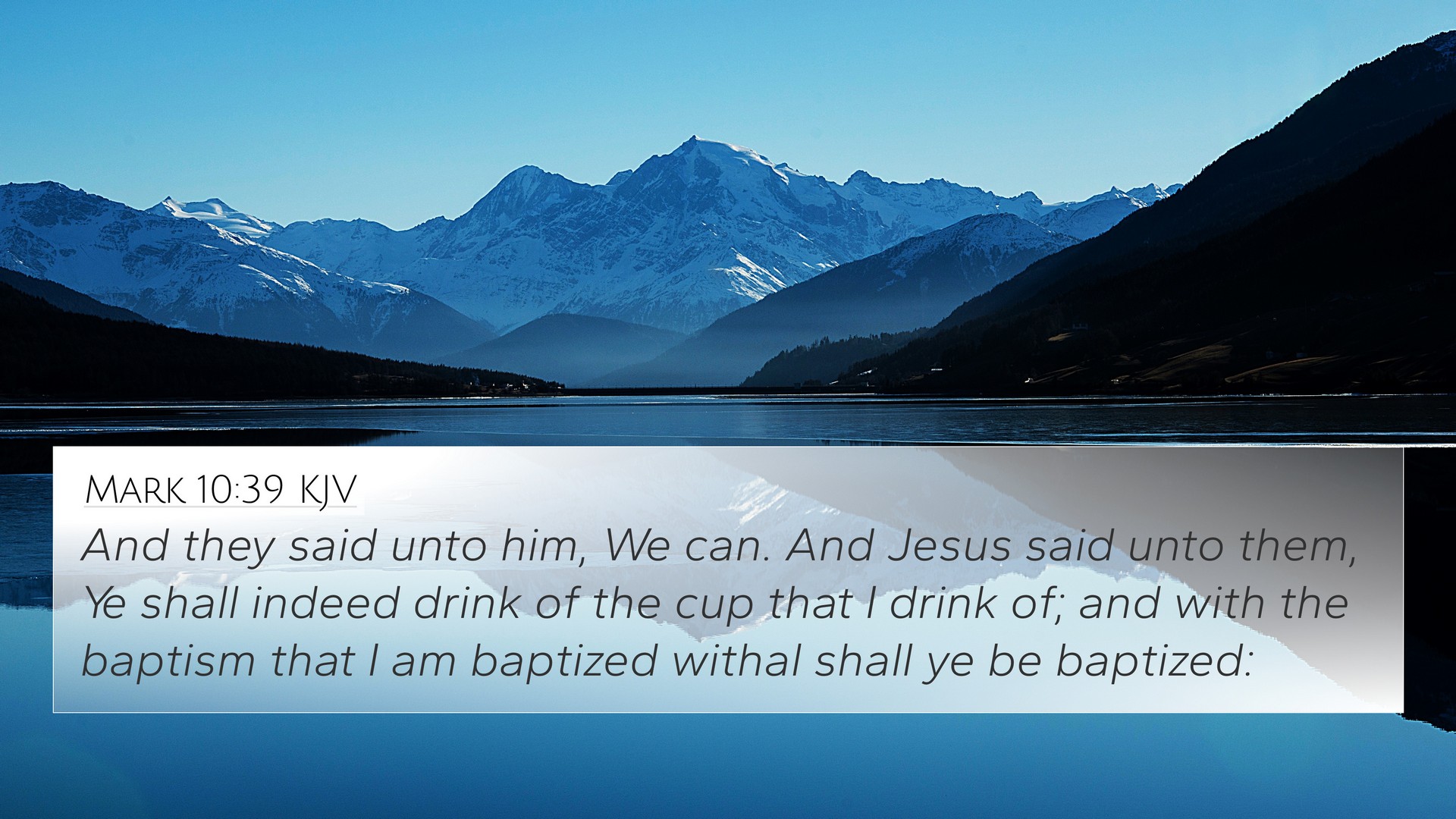Understanding Mark 10:39
Mark 10:39 reads: "They said to him, 'We can.' And Jesus said to them, 'You will drink the cup that I drink, and with the baptism with which I am baptized, you will be baptized.'
This verse captures a profound moment in the New Testament, where Jesus speaks to His disciples about their forthcoming sufferings and the commitment required of them. By analyzing this scripture, one can uncover several layers of meaning, as well as connections to other biblical passages that enrich our understanding of discipleship and suffering.
Commentary Insights
The commentaries by Matthew Henry, Adam Clarke, and Albert Barnes provide deep insights into this verse, exploring themes of sacrifice, commitment, and the reality of following Jesus.
Matthe Henry's Commentary
Matthew Henry emphasizes the importance of understanding the cost of discipleship. He explains that the cup symbolizes suffering and trials that Jesus would endure, and which His followers must also be prepared to face. Henry states, "The followers of Christ must partake of His sufferings if they wish to participate in His glory."
Albert Barnes' Insights
Albert Barnes interprets the verse with a focus on the seriousness of their commitment. He notes that the disciples' confident assertion, "We can," reflects their eagerness but also their lack of understanding regarding the severity of what lies ahead. He suggests this indicates the importance of humility and readiness to embrace hardship in the path of faith.
Adam Clarke's Interpretation
Adam Clarke elaborates on the term "baptism," linking it not only to water baptism but also to the suffering that one must undergo as part of following Christ. He asserts that "to be baptized with the same baptism as Christ implies a deep and often painful transformation."
Thematic Connections and Cross-Referencing
Mark 10:39 resonates with numerous other scriptures, highlighting key themes throughout the Bible.
- Luke 9:23-24: "If anyone would come after me, let him deny himself and take up his cross daily and follow me." This parallels the call to suffer and sacrifice in following Jesus.
- Matthew 20:22: "Are you able to drink the cup that I am to drink?" This passage further emphasizes Jesus' mention of the cup of suffering.
- Philippians 1:29: "For it has been granted to you that for the sake of Christ you should not only believe in him but also suffer for his sake." This verse mirrors the theme of suffering as part of Christian discipleship.
- 2 Timothy 2:12: "If we endure, we will also reign with him; if we deny him, he also will deny us." This indicates the reciprocal nature of suffering and reward.
- 1 Peter 4:13: "But rejoice insofar as you share Christ's sufferings, that you may also rejoice and be glad when his glory is revealed." This verse highlights the joy intertwined with suffering for Christ.
- John 15:20: "Remember the word that I said to you: ‘A servant is not greater than his master.’ If they persecuted me, they will also persecute you." This recollects the shared experience of suffering among disciples.
- Romans 8:17: "And if children, then heirs—heirs of God and fellow heirs with Christ, provided we suffer with him in order that we may also be glorified with him." This emphasizes the necessity of suffering before glory.
Conclusions on Discipleship and Suffering
In summary, Mark 10:39 serves as a powerful reminder of the challenges that accompany the Christian journey. The insights from Matthew Henry, Albert Barnes, and Adam Clarke, together with supporting scriptures, illustrate the complexities and responsibilities of discipleship.
Through a careful understanding of this verse, readers can appreciate also how the Bible verse cross-references deepen the comprehension and application of God's Word in daily life. Cross-referencing these biblical texts aids in recognizing connections between Bible verses, allowing for a richer engagement with Scripture.
Applying Cross-Referencing in Study
For those seeking to explore these connections and deepen their faith, tools for Bible cross-referencing can be invaluable. Engaging in cross-reference Bible study enables believers to build a stronger theological framework.
As you study, consider how to use the Bible cross-reference system to uncover additional themes and scriptures that relate to Mark 10:39 and its significance in the broader biblical narrative.











